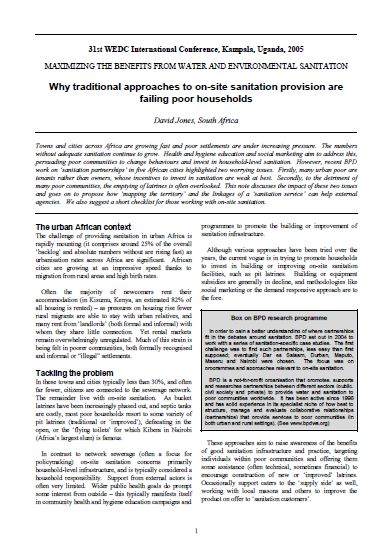Why traditional approaches to on-site sanitation provision are failing poor households
Schaub-Jones, D. (2005)

Published in: 2005
Publisher:
Building Partnerships for Development (BPD), Water and Sanitation for the Urban Poor (WSUP), UK
Author:
Schaub-Jones, D.
Uploaded by:
SuSanA secretariat
Partner profile:
common upload
8208 Views
96 Downloads
Content - Summary
This note discusses the impact of these two issues and goes on to propose how ‘mapping the territory’ and the linkages of a ‘sanitation service’ can help external agencies.
Towns and cities across Africa are growing fast and poor settlements are under increasing pressure. The numbers without adequate sanitation continue to grow. Health and hygiene education and social marketing aim to address this, persuading poor communities to change behaviours and invest in household-level sanitation. However, recent BPD work on ‘sanitation partnerships’ in five African cities highlighted two worrying issues. Firstly, many urban poor are tenants rather than owners, whose incentives to invest in sanitation are weak at best. Secondly, to the detriment of many poor communities, the emptying of latrines is often overlooked. This note discusses the impact of these two issues and goes on to propose how ‘mapping the territory’ and the linkages of a ‘sanitation service’ can help external agencies.
Bibliographic information
Schaub-Jones, D. (2005). Why traditional approaches to on-site sanitation provision are failing poor households. Building Partnerships for Development (BPD), Water and Sanitation for the Urban Poor (WSUP), UK
Filter tags
English Faecal sludge treatment processes Sub-Saharan Africa Urban informal settlements (slums)















